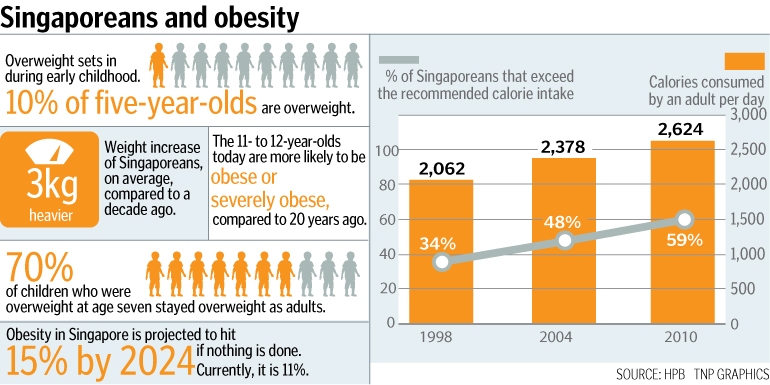Singapore at risk of becoming fat nation
Average Singaporean 3kg heavier than 15 years ago and likely to overeat, HPB study shows
In just seven years, Singapore could reach a tipping point and lose valuable ground in fighting obesity.
This warning came as the Health Promotion Board (HPB) released its most extensive data on Singaporeans and obesity.
If nothing is done, Singapore could hit obesity rates of 15 per cent in just seven years, said Dr Annie Ling, HPB's director of policy, research and surveillance.
That was the point at which obesity increased rapidly in the United States, where it is now considered an epidemic.
Obese people are at higher risk of developing health problems such as diabetes, heart disease and stroke.
Today, the average Singaporean is heavier and more likely to overeat. Even children here are putting on weight and, unsurprisingly, the biggest weight gain occurs when people start work.
These were some of the findings from the HPB's analysis of nearly 30 years of data to find out when Singaporeans begin putting on weight and how obesity trends have changed.
Dr Ling said: "To our knowledge, this is the first local study looking at the obesity transition all the way from childhood into adulthood, using the biggest data set ever."
Her team tracked more than 60,000 people from 1990, following some up from childhood all the way to when they started work.

First, they found that Singaporeans are, on average, 3kg heavier today than they were 15 years ago. The median body mass index score for adults last year was 23.15 - just outside the healthy range, and above the 2001 median of 22.23.
The analysis also found that Singaporeans are exercising slightly more these days - but eating so much that it outweighs any benefit to their health.
In the first quarter of 2014, 54.3 per cent of people said that they get the recommended 150 minutes of physical activity a week. By the third quarter of last year, this had gone up to 59.6 per cent.
But bring this down to the individual, Dr Ling said, and it translates to only two or three extra minutes of activity every day.
In contrast, the average Singaporean is consuming more calories than before and more likely to exceed the recommended daily intake.
In 1998, people consumed 2,062 calories a day on average, with a third of them eating more than the recommended amount. By 2010, they were consuming 2,624 calories daily. Six in 10 were exceeding their recommended intake.
"Efforts to get Singaporeans active may not be enough to offset the caloric consumption," Dr Ling said.
Fat children are also far more likely to become overweight adults, the study found. Seven in 10 children who were overweight at age seven remained that way into their adult years.
This flies in the face of the popular belief that chubby kids will outgrow their baby fat. They are finding it harder to lose weight nowadays due in large part to our increasingly sedentary lifestyle, said Dr Ling.
The findings show there has been a population-wide shift towards obesity, which could prove difficult to tackle if it gets out of hand, she warned.
Since 2004, Singapore's obesity rates have increased by 0.7 percentage point a year and stood at 11 per cent, according to the last National Health Survey in 2010.
"If we don't slow down or halt this shift, eventually we will be tilting over to the obese and overweight category, and it will be much harder to treat or reverse this condition when people get there," she said.
Get The New Paper on your phone with the free TNP app. Download from the Apple App Store or Google Play Store now



